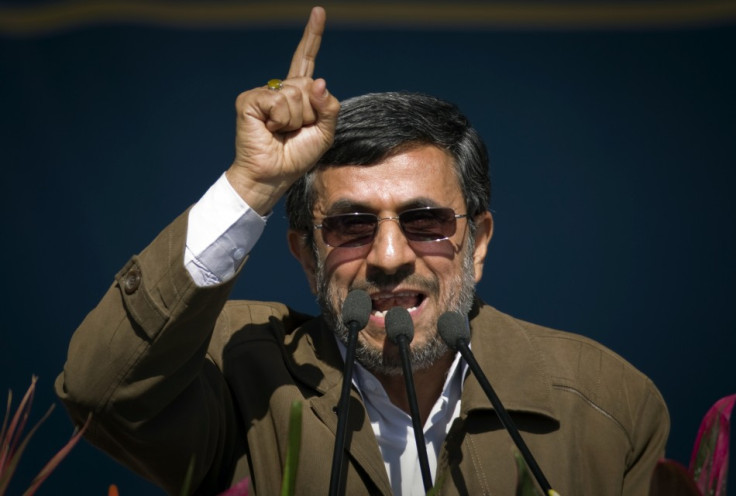Iran Speaks of 'Major' Nuclear Announcement, Ahmadinejad Says Details to be Revealed Soon [VIDEO]

The President of Iran has made a startling announcement... one sure to set alarm bells ringing throughout the White House, the European Union (EU) and in the International Atomic Energy Agency (IAEA).
According to multiple reports, President Mahmoud Ahmadinejad was quoted by state media, on Saturday, as saying his country would reveal "several major achievements in the nuclear domain" within the next few days.
The stand-off between an Iranian government intent on pursuing what they claim as a peaceable nuclear enrichment programme and the bloc of Western nations, including the U.S. and the UK, has been running for nearly a decade now. The U.S. and the UK, along with the United Nations (UN), the IAEA and the EU not only view announcements of peaceable intent with scepticism but on occasion have also directly accused the Middle Eastern country of both actively harbouring terrorists and pursuing a nuclear weapons programme.
A Reuters report on the issue indicated President Ahmadinejad was speaking on the 33<sup>rd anniversary of the Islamic revolution that overthrew the last Shah.
"In the coming days the world will witness Iran's announcement of its very important and very major nuclear achievements," Ahmadinejad told a crowd at Tehran's Azadi (Freedom) Square in a speech relayed live on state television. The President would not divulge any more details but military officials reiterated their warning that any show of force from the Western nations would be met with a similarly "painful" answer. The Reuters report also quoted Mohammad Shirdel, a Revolutionary Guards Commander, as saying "If attacked by the Zionist regime (Israel), we will turn it to dust".
The situation concerning Iran's nuclear state dates back to January, 2002, when former President of the U.S., George described Iran, Iraq and North Korea as an "axis of evil" and spoke of the proliferation of long-range missiles in all three countries. Global fears were apparently further compounded in September of that year, when Russia began helping Iran on the construction of a nuclear reactor at Bushehr. Since then, the U.S., the EU and the IAEA have been attempting to stringently monitor Iran's nuclear capabilities, in the face of what they perceived as inconsistent and deceitful behaviour on the latter's part.
Incidentally, in response to the newest round of economic sanctions imposed by the EU, President Ahmadinejad said his economy was "flourishing".
"We have saved over $30 billion for rainy days," he said, adding, "Iran's non-oil exports will reach over $43 billion by March ... Iran's imports in the past 10 months dropped five percent."
In 2009, Iran announced a second uranium enrichment site (uranium enrichment is key to developing weapons-grade nuclear fuel) at Qom but insists it is for peaceful purposes. In 2011, the country's nuclear chief, Ali Akbar Salehi, confirmed the country had technology to make fuel plates and rods for reactors. More recently, a CNN report cited the incident of Iranian military exercises in the Persian Gulf as a possible boiling point.
Meanwhile, as a follow-up to the November 2011 report filed by the IAEA (whose harsh assessment of the situation led to a fourth round of sanctions on Iran, including a EU-approved ban on import of Iranian crude oil), the agency is expected to release an even more damning one next month. An Israeli news source, Haaretz, reported saying "The upcoming follow-up report from the IAEA will apparently include new details about the effort by Tehran to develop a nuclear warhead for a ground-to-ground missile".
Finally, an IAEA delegation is expected in the Iranian capital of Tehran, on Feb. 20 and Feb. 21, for another round of discussions. In a statement released on Feb. 1, the international nuclear watchdog agency said they were "committed to intensifying dialogue. It remains essential to make progress on substantive issues".
There has, so far, been no major reaction, from any of the concerned parties, over this latest announcement. While the latest sanctions, imposed last month, will certainly hurt the Iranians (a First Post report suggests they are now looking to barter gold bullion and oil for food), the passionate statements made by Ahmadinejad and top military officials seem to indicate they are in no mood to negotiate.
In a Haaretz report from earlier in the year, Iran's ambassador to Russia, Seyyed Mahmoud-Reza Sajjadi, said his country was capable of striking U.S. forces anywhere in the world if it was attacked.
"The Americans know very well what Iran is like and what our potential is," Sajjadi was quoted as saying by Russia's Interfax news agency, "Iran is in a very good position to deliver retaliatory strikes on America around the world ... An attack on Iran would be suicidal for them."
As it stands now, therefore, the world is at a bit of a crossroad.
Neither the U.S. nor the EU can afford any sort of military action, prolonged or otherwise. Mounting deficits in both regions (the result of wars in Afghanistan and Iraq, on the one hand, and the Eurozone crisis on the other) mean that a peaceful resolution is a must.
However, this is something the Iranians are clearly aware of. It could be their trump card.
Meanwhile, check out a video of President Ahmedinejad's speech here...
Must Read:
Iran's Nuclear Announcement Revealed: Country Announces Fuel Rods for Tehran Reactor
© Copyright IBTimes 2024. All rights reserved.





